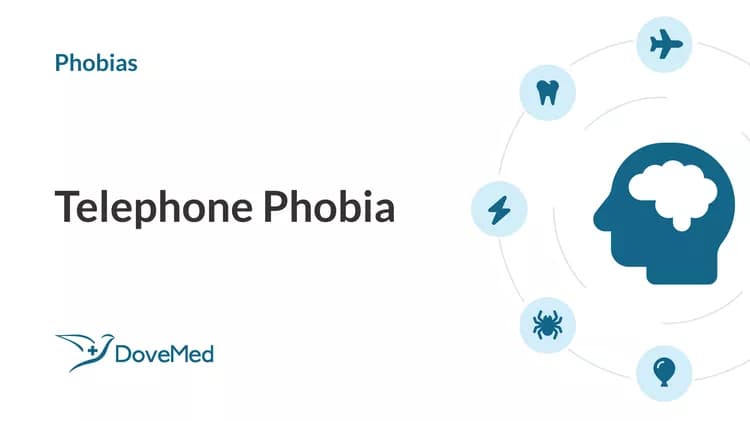What are the other Names for this Condition? (Also known as/Synonyms)
- Fear of Phone Calls
- Telephobia
- Telephone Anxiety
What is Telephone Phobia? (Definition/Background Information)
- Telephone Phobia is a fear or anxiety of making or receiving phone calls. Anyone can develop Telephone Phobia, but it's more common in people with social anxiety or communication difficulties.
- The causes are not well understood but may be related to negative past experiences, fear of being judged, or difficulty with communication. The risk factors include anxiety disorders, social isolation, and hearing or speech difficulties.
- Symptoms include anxiety or panic attacks, avoidance of phone calls, and physical symptoms like sweating or shaking. Diagnosis is typically based on a patient's symptoms and medical history.
- Treatment for Telephone Phobia may involve cognitive behavioral therapy, exposure therapy, or medication. Prevention strategies include practicing communication skills and seeking treatment for related anxiety or social disorders.
- With proper treatment, the prognosis for Telephone Phobia is generally good. However, if untreated, complications may include social isolation, employment difficulties, and worsening anxiety.
Who gets Telephone Phobia? (Age and Sex Distribution)
- Telephone Phobia can affect individuals of any age or background, but it is more common in those with social anxiety disorder, generalized anxiety disorder, or other anxiety disorders.
- It may also be more common in individuals who have had negative past experiences with phone calls or have a fear of being judged or criticized.
What are the Risk Factors for Telephone Phobia? (Predisposing Factors)
Some risk factors that may increase the likelihood of developing Telephone Phobia include:
- Existing anxiety disorders or other mental health conditions
- Negative past experiences with phone calls
- Advanced age
- Lack of social support or isolation
- Limited experience or exposure to making or receiving phone calls
It is important to note that having a risk factor does not mean that one will get the condition. A risk factor increases one’s chances of getting a condition compared to an individual without the risk factors. Some risk factors are more important than others.
Also, not having a risk factor does not mean that an individual will not get the condition. It is always important to discuss the effect of risk factors with your healthcare provider.
What are the Causes of Telephone Phobia? (Etiology)
The causes of Telephone Phobia can be complex and may vary from person to person. Some possible causes include:
- Fear of the unknown or fear of negative consequences
- Negative past experiences with phone calls, such as being criticized or embarrassed
- Social anxiety or generalized anxiety disorder
- Personality traits, such as introversion or perfectionism
- Cultural or societal attitudes toward phone calls
What are the Signs and Symptoms of Telephone Phobia?
Some common signs and symptoms of Telephone Phobia include:
- Avoidance of making or receiving phone calls
- Difficulty communicating effectively over the phone
- Fear or anxiety related to making or receiving phone calls
- Physical symptoms such as sweating, trembling, or racing heart
- Difficulty concentrating or staying focused during phone calls
- Negative attitudes towards phone calls or technology in general
How is Telephone Phobia Diagnosed?
- Diagnosis of Telephone Phobia is typically made by a mental health professional based on an evaluation of symptoms and medical history.
- The professional may also use standardized assessments or questionnaires to help diagnose the condition.
Many clinical conditions may have similar signs and symptoms. Your healthcare provider may perform additional tests to rule out other clinical conditions to arrive at a definitive diagnosis.
What are the possible Complications of Telephone Phobia?
- Untreated Telephone Phobia can lead to impairment in daily life, difficulty communicating with others, and negative impacts on mental health.
- It may also lead to social isolation and avoidance of necessary tasks or responsibilities.
How is Telephone Phobia Treated?
Treatment for Telephone Phobia may include:
- Psychotherapy, such as cognitive behavioral therapy (CBT)
- Medications, such as anti-anxiety drugs
- Lifestyle changes, such as exposure therapy or relaxation techniques
- Seeking support from loved ones or joining support groups
How can Telephone Phobia be Prevented?
Prevention of Telephone Phobia may include:
- Gradually exposing oneself to phone calls and practicing communication skills
- Seeking help if needed, such as from a mental health professional
- Practicing relaxation techniques, such as deep breathing or meditation
- Addressing negative attitudes or beliefs toward phone calls or technology
What is the Prognosis of Telephone Phobia? (Outcomes/Resolutions)
- With proper treatment and management, most individuals with Telephone Phobia can improve their symptoms and quality of life.
- It may take time and effort to overcome the fear, but many people are able to learn effective communication skills and reduce their anxiety related to phone calls.
Additional and Relevant Useful Information for Telephone Phobia:
The following link is a useful resource for information on other mental health conditions on DoveMed:
https://www.dovemed.com/healthy-living/emotional-well-being/
Related Articles
Test Your Knowledge
Asked by users
Related Centers
Related Specialties
Related Physicians
Related Procedures
Related Resources
Join DoveHubs
and connect with fellow professionals


0 Comments
Please log in to post a comment.